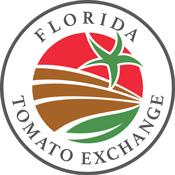The Florida Tomato Exchange advocates for food safety regulations at the state and federal level to ensure safe growing, handling, and shipping of fresh produce throughout North America.
Starting in 2006, the FTE helped lead a national effort to codify science-based and risk-based protocols for growing and packing tomatoes, resulting in Commodity Specific Food Safety Guidelines for the Fresh Tomato Supply Chain.
In 2008, at the urging of the FTE, Florida became the first state in the country to adopt a comprehensive food safety program with mandatory government inspection and audit for tomato production and packing. In fact, this was a first for any segment of the fresh produce industry, nationwide. These rules, known as Good Agricultural Practices (GAPs) and Best Management Practices (BMPs), were adopted as state regulations on July 1, 2008 and are enforced by the Florida Department of Agriculture and Consumer Services.
Given the highly integrated nature of the North American tomato supply chain, the FTE believes that U.S. food safety regulations must be equally applied to imported produce, just as they are applied to produce grown in the U.S. From a consumer perspective, food safety is only as effective as the weakest link in the system, which is why enforcement of high standards is crucial.
